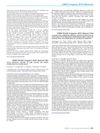
Padina arborescens and its component MOGG may help prevent hair loss through several actions, including blocking a hair loss-related enzyme.
Marine sponges from Tabuhan Island can inhibit enzymes linked to Alzheimer's and hair loss.
 April 2019 in “Actas Dermo-Sifiliográficas”
April 2019 in “Actas Dermo-Sifiliográficas” The conclusion is that having both Frontal Fibrosing Alopecia and Discoid Lupus Erythematosus may suggest a shared immune response in certain people, and a mix of antimalarial drugs and 5-alfa-reductase inhibitors is recommended for treatment.
 September 2018 in “Journal of Experimental & Biomedical Sciences”
September 2018 in “Journal of Experimental & Biomedical Sciences” DK peptides can reduce hair loss by inhibiting the 5α-reductase enzyme and have antioxidant effects.
 July 2018 in “DOAJ (DOAJ: Directory of Open Access Journals)”
July 2018 in “DOAJ (DOAJ: Directory of Open Access Journals)” The new gel formula could improve the delivery of a hair loss treatment through the skin and might be an alternative to taking it by mouth.
January 2018 in “Elsevier eBooks” 5α-reductase-2 deficiency causes ambiguous genitalia at birth and affects male sexual development, but individuals often develop male characteristics at puberty.
 January 2018 in “Springer eBooks”
January 2018 in “Springer eBooks” Different races and genders have unique skin and hair issues, requiring specialized care and more research for effective treatment.
Male hormones can decrease the ability of immune cells to fight bacteria.
 December 2017 in “Dong-ui saengni byeongni hakoeji”
December 2017 in “Dong-ui saengni byeongni hakoeji” Cynanchi Wilfordii Radix has strong antioxidant effects and may help treat male hair loss.
November 2017 in “JAMA internal medicine” Women also use 5α-reductase inhibitors for hair loss and hirsutism.
 November 2017 in “JAMA internal medicine”
November 2017 in “JAMA internal medicine” Women also use 5α-reductase inhibitors, and their effects differ from men.
 May 2017 in “Journal of The American Academy of Dermatology”
May 2017 in “Journal of The American Academy of Dermatology” LED light helps human hair root cells grow and prevents them from dying by activating specific growth pathways.
 January 2017 in “Korean Journal of Pharmacognosy”
January 2017 in “Korean Journal of Pharmacognosy” Modified red ginseng extract promotes hair growth and has antioxidant and anti-inflammatory effects.
 September 2016 in “Journal of Dermatological Science”
September 2016 in “Journal of Dermatological Science” Plasmacytoid dendritic cells, which overproduce IFN-α, may play a crucial role in starting alopecia areata, an autoimmune disease causing hair loss.
 April 2016 in “Journal of Investigative Dermatology”
April 2016 in “Journal of Investigative Dermatology” Pdgfα signaling helps maintain fat cells in the skin and is important for hair growth, wound healing, and fighting infections.
January 2016 in “프로그램북(구 초록집)” Hormones and neuropeptides affect hair growth, with androgens having opposite effects on beard and scalp hair.
 June 2015 in “한국화장품미용학회지”
June 2015 in “한국화장품미용학회지” AT-Grow, a natural product, might help with a common type of hair loss by reducing DHT levels.
 May 2015 in “Journal of The American Academy of Dermatology”
May 2015 in “Journal of The American Academy of Dermatology” Young men taking finasteride for hair loss have a higher risk of sexual dysfunction.
 March 2014 in “Journal of The American Academy of Dermatology”
March 2014 in “Journal of The American Academy of Dermatology” TNF-a may not be as involved in certain types of hair loss as previously thought.
 November 2012 in “Endocrine Practice”
November 2012 in “Endocrine Practice” Enzymes called 5α-reductases have many body functions and need more research to safely use inhibitors.
 April 2012 in “Encyclopedia of Life Sciences”
April 2012 in “Encyclopedia of Life Sciences” Different genes are linked to various types of hair loss.
April 2011 in “Journal of Medicinal Plants Research” Ocimum basilicum L. and red Oryza sativa L. may help with hair loss and prostate issues.
 October 2010 in “Journal of Men's Health”
October 2010 in “Journal of Men's Health” Some patients may experience lasting sexual dysfunction, depression, and other side effects from 5α-reductase inhibitor therapy.
 October 2010 in “Journal of Men's Health”
October 2010 in “Journal of Men's Health” Larger prostate size in older men may be linked to poorer semen quality and fertility issues.
 October 2010 in “Journal of Men's Health”
October 2010 in “Journal of Men's Health” The conclusion is that doctors should be careful when prescribing 5α-reductase inhibitors due to possible serious side effects, and they should discuss these risks with patients.
January 2010 in “Research and Practice on Chinese Medicines” Coffee extract and caffeotannic acid can help treat hair loss.
 January 2006 in “The Journal of Korean Medicine Ophthalmology and Otolaryngology and Dermatology”
January 2006 in “The Journal of Korean Medicine Ophthalmology and Otolaryngology and Dermatology” Rubus coreanum may help hair growth but not through the tested mechanisms, and none of the herbal extracts help with acne.
Estrogen and its receptors play a key role in hair growth, with differences between males and females.
February 1996 in “Clinical Pharmacology & Therapeutics” MK-386 reduces sebum DHT levels.
 April 1992 in “Current opinion in therapeutic patents”
April 1992 in “Current opinion in therapeutic patents” New steroids were patented as effective for treating acne, hair loss, and other conditions related to hormones.





















